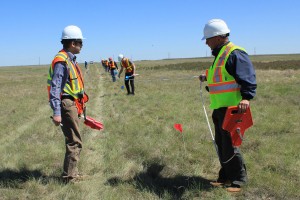A sponsorship agreement between Klohn Crippen Berger and CMC Research Institutes (CMC) will further collaborative research to develop and improve monitoring technologies that ensure the safe underground storage of CO2 and other fluids.
“We welcome Klohn Crippen Berger’s interest in and support for our program at the Field Research Station,” said Don Lawton, director of CMC’s Containment and Monitoring Institute (CaMI) which operates the research station. “Direct industry involvement in the research agenda will give us insight into the real-world challenges they face, allowing us to develop cost-effective, environmentally sustainable solutions.”
Klohn Crippen Berger (KCB) will contribute $50,000 a year to the Field Research Station for up to four years. As a sponsor, KCB will have the opportunity to prioritize research opportunities, bring forward new research directions, and provide guidance on the overall research program. The company will also have a seat on the Research Steering Committee, to be convened after the build phase of the Field Research Station.
“This is an exciting opportunity to further our industry’s understanding of the behaviour of CO2 and other fluids,” said Len Murray, President and CEO of Klohn Crippen Berger. “As we familiarize ourselves with the outcomes of this research, our hydrogeologists at KCB will look for opportunities to develop practical applications which benefit our clients in the oil & gas and oil sands industry.”
A Canadian First
The Field Research Station (FRS) is Canada’s first facility dedicated to the research and development of a broad range of technologies for monitoring carbon dioxide and other fluids injected and stored underground. The site, located in Newell County 20 km southwest of Brooks, will allow researchers and technology developers to test and calibrate many different types of monitoring technologies in order to quantify the detection threshold of CO2 at intermediate depths (300 m) below the ground.
Research at the field station can also be applied to other sectors in the oil and gas industry such as the steam-driven, in-situ oil sands industry to ensure underground steam chamber containment, the shale gas industry to monitor hydraulic fracturing (including fugitive methane migration and potential methane contamination of groundwater), and in other applications such as the subsurface disposal of process water and acid gas.
“Research at this facility has broader application than carbon capture and storage. It will allow us to better understand gas migration in the subsurface at shallow to intermediate depths. There is no other research facility in Canada that provides for these kinds of research outcomes,” says Lawton, who is also a geoscience professor at the University of Calgary.
International Researchers Onsite
Already at the site, researchers from across Canada, the UK, and from the Lawrence Berkeley National Laboratory in the U.S. have sited equipment at the FRS to collect baseline information as part of the research program. Technologies currently surrounding the site include seven broadband seismometers and a seismic array. In the site’s two observation wells are an electrical resistivity tomography array, fibre optic cables for acoustic and temperature sensing as well as distributed heat pulsing, down hole equipment for seismic crosswell surveys, and a U-tube system for sampling fluids from the injection reservoir. Three shallow groundwater monitoring wells have also been drilled in the vicinity of the injection well in conjunction with G360 – the Centre for Applied Groundwater Research at the University of Guelph.
“Sponsors will have access to in-depth results from all of these surveys and they will be given the results at an annual meeting held for sponsors only,” said Lawton, adding sponsors are also able to contribute equipment and conduct their own work at the site.
Companies can also conduct or contract confidential work at the site if they don’t wish to share their results.
“We want the world to know that we are open for business. The research conducted here is critical to advancing solutions for safe underground storage of a wide range of gases and fluids, including CO2,” said Lawton.
To learn more about how to conduct research at, or sponsor, the Field Research Station contact Lawton at don.lawton@cmcghg.com or call 403 210-6671.
About Klohn Crippen Berger Ltd.
Klohn Crippen Berger Ltd. (KCB) is a leading engineering, geoscience and environmental consulting firm with its head office in Vancouver, and nine offices in other locations in Canada, Peru and Australia. KCB has 65 years of participating in some of the largest and most challenging engineering projects in the world and offer a full range of services in oil and gas, mining, environment, water, power and transportation sectors.
Media Inquiries for KCB: 604 669-3800
